Auto Anthro: Why luxury trucks don’t have luxury badges
Jack Swansey holds a degree in anthropology with a focus on car culture, and he is the world’s leading ethnographic authority (by default, if you must know) on NASCAR fandom. His love of the automobile fuels him to discover what cars mean to the people who own, drive, and love them. —EW
According to Kelley Blue Book figures as of October 2022, the average sale price of a new full-size pickup truck is $63,231, up 9.4 percent over last year, and nearly $9500 more than the average price of an entry-level luxury car.
Over sixty-three thousand dollars. That sum could cover a generously optioned BMW M340i or Porsche Macan—and that’s the average sale price. Ford’s top-of-the-line F-150 Limited costs just north of $85,000 before options, and certain trim lines on heavy-duty trucks crack six figures. Stuffed with leather, premium sound systems, and advanced tech features, these luxury pickups are about as far from the ordinary white work truck as a pigeon is from a peacock.

Why are Americans so willing to spend luxury-car prices on pickups from mainstream brands while the same product from a premium nameplate flops? Lincoln’s Blackwood and Mark LT couldn’t make it more than four collective model years while every Ford King Ranch that rolls off the line has a willing buyer.
There might be an anthropological explanation for this phenomenon. Hear me out: We Americans like trucks—and luxury trucks, in the proper context—in concert with our country’s deep-rooted Protestant work ethic.
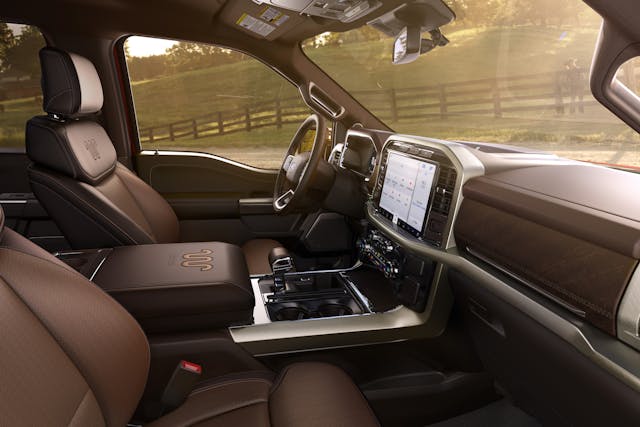
The phrase “Protestant ethic” was first used by the early 20th-century German sociologist Max Weber, but he was not the first to recognize the American society’s emphasis on the moral character of hard work. Alexis de Tocqueville marveled at the same phenomenon a century earlier. The Puritans considered economic success reflective of God’s favor. Even colonial Jamestown settler John Smith commanded: “He who will not work shall not eat.” From the very beginning, a pseudo- or openly religious glorification of labor has informed the way Americans interact with the world and each other.
The Protestant ethic is reinforced by the structure of our economy, the policy of our government, and yes, heroic national myths like the winning of the frontier. What started as Puritan religious dogma morphed into Gilded Age “bootstrap” fables, and eventually into the idealized blue-collar workers of Chevy’s “Like a Rock” ads. The ethic survives, changing with the times.

If there is one vehicle reflective of American values, it’s the trusty pickup truck. This is a machine that offers immense versatility and inherent practical value to the worker, but in the United States it has also come to represent significant value in the social hierarchy. Anyone who has felt the warm embrace of a GMC Denali interior knows that these are proper luxury vehicles—save for the badge.

Modern American culture in 2022 is much more diverse and multifaceted than it was in the 17th century, or even the early 20th, but the Puritan legacy is still evident. In many traditional circles, hard work is regarded as a fundamental moral good, while displays of wealth are considered vulgar. No matter how much money someone makes, carrying a camping pack through the woods, setting up a tent, cooking beans on a campfire, and sleeping under the stars makes people feel satisfied. Connected to nature. Blue jeans, although they were originally marketed as a uniform for miners in the California Gold Rush, have thoroughly permeated American fashion from the most basic threads to $300 raw denim.
Let’s go a step further. We’ve established that Weber’s Protestant work ethic considers labor to be a moral obligation, a commandment even. To watch the Super Bowl is to be inundated with marketing that idolizes hard work, the pickup truck its towering, mulch-hauling, stump-pulling symbol. Hard-hat-wearing miners, construction workers, and farmers treat trucks with generational reverence. Physical labor is often dirty and physically demanding, of course, though not always cinematically so. It’s a cliché, but only because it’s rooted in something real. Advertisers didn’t make it up to sell Trail Boss–emblazoned floor mats. Like independence and self-reliance, hard work—physical or otherwise—is an American value already underlying the stories many of us tell ourselves about ourselves and our country.

Consider that from our nation’s beginnings as a British colony well into the 20th century, most Americans still lived and worked in rural communities. The American economy transitioned rapidly to modern capitalism while our society was still mostly agricultural; our mainstream national values remain laced with the rugged individualism that characterized Thomas Jefferson’s ideal yeoman farmer. Today, the proportion of Americans who make their living via agriculture has never been slimmer. Truck manufacturers nevertheless still trade on the cultural pull of that figure. You may remember Ram’s “God made a farmer” commercial from back in 2013. One could argue we are now more a nation of contractors than growers, but the fact remains that tons of people still do serious physical labor, and they rely on their pickups—even the luxury models—to make their living.
https://www.youtube.com/watch?v=AMpZ0TGjbWE&ab_channel=RamTrucks
***
“Wait a minute,” you’re probably asking, “I get why people want trucks, but not why they’re willing to pay Mercedes-Benz prices for them.” Ah, but Weber has more to add on that subject:
“[The Puritans] did not wish to impose mortification on the man of wealth, but the use of his means for necessary and practical things.”
This is the crux of it. A truck is an infinitely practical device for work, and therefore, the ethic tells us, worth paying for. Even if a four-door pickup truck is primarily used for passengers, groceries, and sports equipment, it can do something a Lexus RX can’t: haul a sheet of plywood or tow a 25-foot cabin cruiser on a moment’s notice.
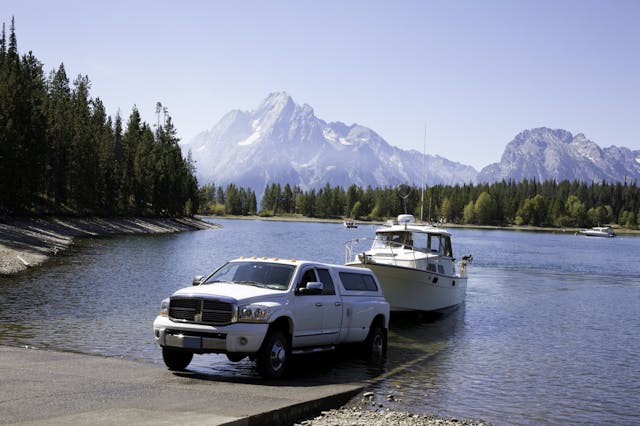
Conversely, high-trim American trucks are some of the most luxurious and stately vehicles on the road. (Not to mention how well they’re engineered.) Comfort features are often generous, and GM’s CornerStep bumpers, Ram and GMC’s multifunction tailgates, and Ford’s Pro Power Onboard electrical system combine technology and convenience in an everyday-usable package. Saving the day in a power outage, pulling a car out of a ditch, or hauling a new refrigerator from Lowe’s might not happen every single day, but the Protestant ethic puts a lot of value in even the potential for practicality. When the need arises, renting a truck from a company or calling up a friend … just hits different.
Finally, we return to the text on the tailgate. Think back again to Lincoln’s Blackwood (2002) and Mark LT (2006–2008). Ford Motor Company moved just 36,187 Lincoln Mark LTs between 2005 and 2009, against 796,039 F-Series trucks in 2006 alone. One can easily imagine that of nearly 800,000 Ford trucks sold, more than 36,000 were optioned highly enough to at least match the price of the Mark LT.
The reason people won’t accept a Lincoln truck is the same reason VW knows it will never figure out how to sell the Amarok in America, and why Mercedes never even tried with the short-lived X-Class.
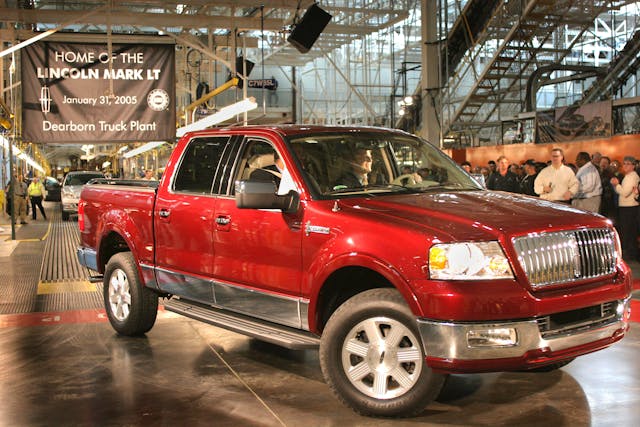
Weber again:
“[To the Puritans], irrational use [of wealth] was exemplified in the outward forms of luxury which their code condemned … this worldly Protestant asceticism … acted powerfully against the spontaneous enjoyment of possessions.”
Dominant historical American values disapprove of outward forms of luxury. Outward luxuries, that is. But when it comes to inward luxuries, like the “Heated and Ventilated Leather Front Bucket Seats with Active Motion” available on the 2022 F-150 Platinum, that’s another story. As long it has a bed, wears a Ford badge on the hood, and looks enough like the base model, it might as well be the Waldorf Astoria inside. A luxury truck is a rational purchase so long as it stays a Ford, Ram, Chevy, or even a GMC. An Escalade EXT pickup? Well, that’s just showing off.
As a non-truck-owning amateur anthropologist, it is my duty to point out that every single vehicle purchase is influenced by cultural and social forces—conscious or otherwise. This isn’t inherently good or bad, it’s just reality. Our culture in America today is diverse, nuanced, and at times contradictory. Certain aspects of it are inescapable.

The Ford Maverick, a four-cylinder unibody minitruck sales phenom, suggests that the social forces driving Americans towards trucks aren’t limited to full-sizers. And despite the hate they sometimes get from truck purists, the Rivian R1T, Ford F-150 Lightning, and Chevrolet Silverado EV are being met with considerable demand. Which tells us that the values people associate with pickup trucks are not inextricably linked to internal combustion.
Detractors will contest that the current crop of full-size trucks isn’t great for pedestrian safety, the atmosphere, or urban street parking. Proponents will fire back that no vehicle meets their various needs so effectively and reliably, and people who don’t understand that probably never will. The debate is so interesting and persistent perhaps because it is a larger societal conversation in miniature—the long-dominant Protestant work ethic being poked at, examined, and weighed against other perspectives. Such scrutiny is a common enough social phenomenon, historically speaking.
For my part, I think there is nothing fundamentally wrong with desiring a high-end vehicle if you can afford it, or a vehicle with extraordinary utilitarian potential for those moments you need it, be that once a week or once a year. Dropping Macan money on a Silverado doesn’t make a whole lot of sense to me personally, but the market at large thinks otherwise. Regardless, it is fascinating the way we showcase (or don’t) our ideas about work and luxury in the vehicles we drive.
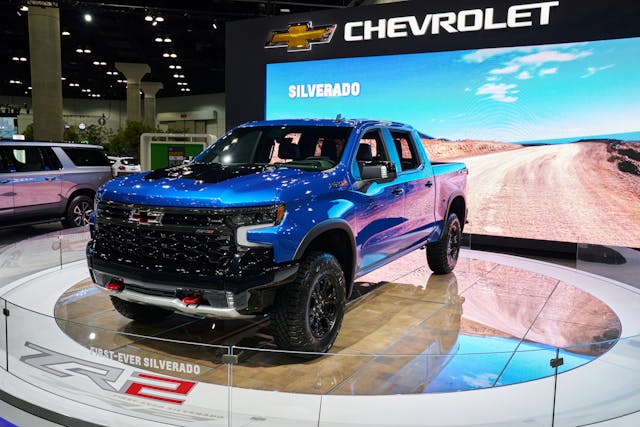
Check out the Hagerty Media homepage so you don’t miss a single story, or better yet, bookmark it.
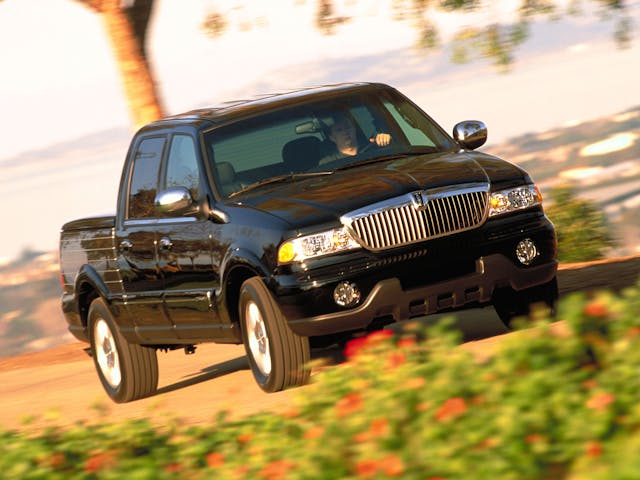


I would seriously enjoy a return or at least the option of a no frills truck. Like any brands from 1978, heat, radio, bench seat, sliding rear and maybe optional carpeting. With a choice of auto or standard transmission. That’s all.
I bought a new Ford Ranger Super Cab 4×4 back in 2011. I still have it & I love it. I’ve owned four of them. It has been the “perfect sized” truck for my needs. The previous GMC Sierra was a tight fit in the garage. I would prefer a full size truck for comfort, but 98% of the time, the Ranger has been the right size truck for my needs. How many 4×8 sheets really get carried around today by the average truck owner? I trailer my motorcycles anyway.
I still say real trucks don’t come with carpeting but the vast majority of owners in my area wouldn’t know how to open the tailgate if they had to.
Years ago I read an article in a car mag that said, “If you can’t drive it through a barbed-wire fence without worrying, it’s not a truck.” That says it all. Wish I could remember the author.
On this truck topic. One of the things very important that no one speaks on, is how cheap they are made, vs how expensive they have gotten. As a tech for 10 plus years, Anything after 2006 is made quite a bit cheaper. Less steel, more plastic. Whip out the plastic hammers and get that nail driven flush. Beer cans bring not enough to haul for recycling yet the aluminum fords are still extremely expensive! Aluminum is cheap !!!! Then all the plastic under the hood, plastic is for wrapping food to store for the next day! Not making intakes out of that crumble after a few years. I can make a list of any of the big 3 at certain mileage and tell you what it will need ! Ram 1500 v8 WILL get a water pump @ 150k miles!!!! The v6 WILL get 3 oil coolers by 150k. ford will need front wheel bearings and struts. The 3.5 turbos will leak oil. Gm and their new stretch belts junk. Then, one of my favorite things SOY BASED WIRING INSULATION THAT RATS LOVE LOVE LOVE!!!!!!!! Fixed injector wiring on a Ford Explorer yesterday !!! Also it was under the foam rat blanket engine cover !!!! Rant over, I’ll enjoy my 1971 c10, all original, paint, engine, WIRING, and the nice long bed that’s low enough for a normal human to step in with a couch in his hands!!!
Many years ago my boss shows up in a brand new Denali…..bragging about its high price….all I had to tell him was “ not only are you in denial but you got it spelled wrong on your truck” …..last time he bragged about it 🙂
I wish Ford would bring the F150 2dr with the inline six. I think it was a 4.9 litre. They were great on fuel, all the power you would need and for the most part, hand crank windows, no power doorlocks and a very basic interior. Just an allround great work truck.
Dodge Grand Caravan swallows up the 4×8 and the hatch closes and guess what? You don’t have to buy the matching cap for your smaller bed.